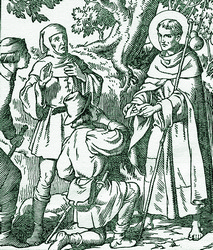Lives of the Saints
Our Models and Protectors
Spiritual Bouquet:
October 20

Saint John Cantius
Priest
(1403-1473)
Saint John was born at Kenty in Poland in 1403. He studied philosophy and theology at the University of Cracow with great intelligence, industry, and success, while his modesty and virtue drew all hearts to him. After earning his degrees, he was appointed to the Chair of Theology at the university. He inflamed his hearers with the desire of every kind of piety, no less by his deeds than by his words. He was ordained a priest and was for a short time in charge of a parish, where he manifested great concern for the poor, at his own expense. At the University's request, he resumed the professor's Chair and taught there until his holy death.
He found a poor man on the snow one day, dying of hunger and cold; he clothed him in his own frock and took him to the rectory, to eat at his table. Afterwards, for many years, every professor of the College of Varsovie was obliged, once every year, to invite a poor man to dine with him.
He made a pilgrimage to Jerusalem, preaching along the way to the Turks, and hoping for the grace of martyrdom. He went four times to Rome to visit the tombs of the Apostles and pay honor to the Holy See, desiring thereby to be spared the pains of purgatory. He always traveled on foot, carrying his own effects. Robbed one day by bandits, he forgot he had a few gold pieces sewn into his cloak; he soon remembered and called them back to give them to his benefactors. They were so astonished they refused to accept the offering, and even returned to him what they had taken.
Saint John Cantius wrote on the walls of his residence some verses which showed the horror he had for the vice of backbiting or detraction, talking without cause of our neighbor's faults. He slept very little and often spent entire nights praying before a crucifix. After his classes he went to pray before the Blessed Sacrament in a church. Before his death, he gave absolutely everything he still had to the poor. He died in 1473, at the age of seventy-six years. The purple robe which he had worn as a Doctor was religiously conserved and always given to the venerable Head of the School of Philosophy on the day of his reception; and a promise was required of the teachers there, to imitate the virtues of this beloved Saint. He is a patron of both Poland and Lithuania; Clement XIII canonized him in 1767.
Reflection: He who orders all his doings according to the Will of God may often be spoken of by the world as simple, even stupid; but in the end he wins the esteem and confidence even of the world itself.
Les Petits Bollandistes: Vies des Saints, by Msgr. Paul Guérin (Bloud et Barral: Paris, 1882), Vol. 12